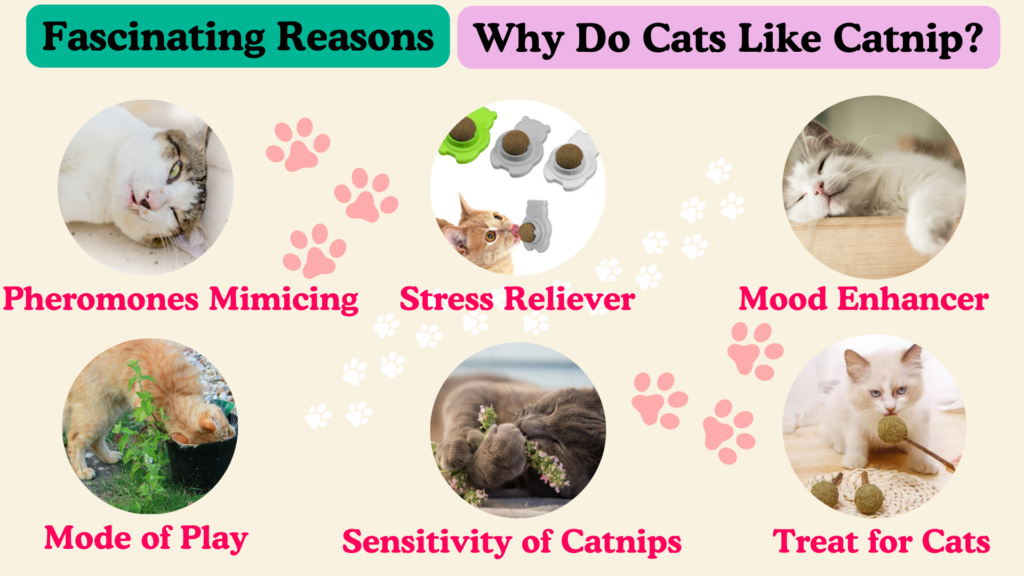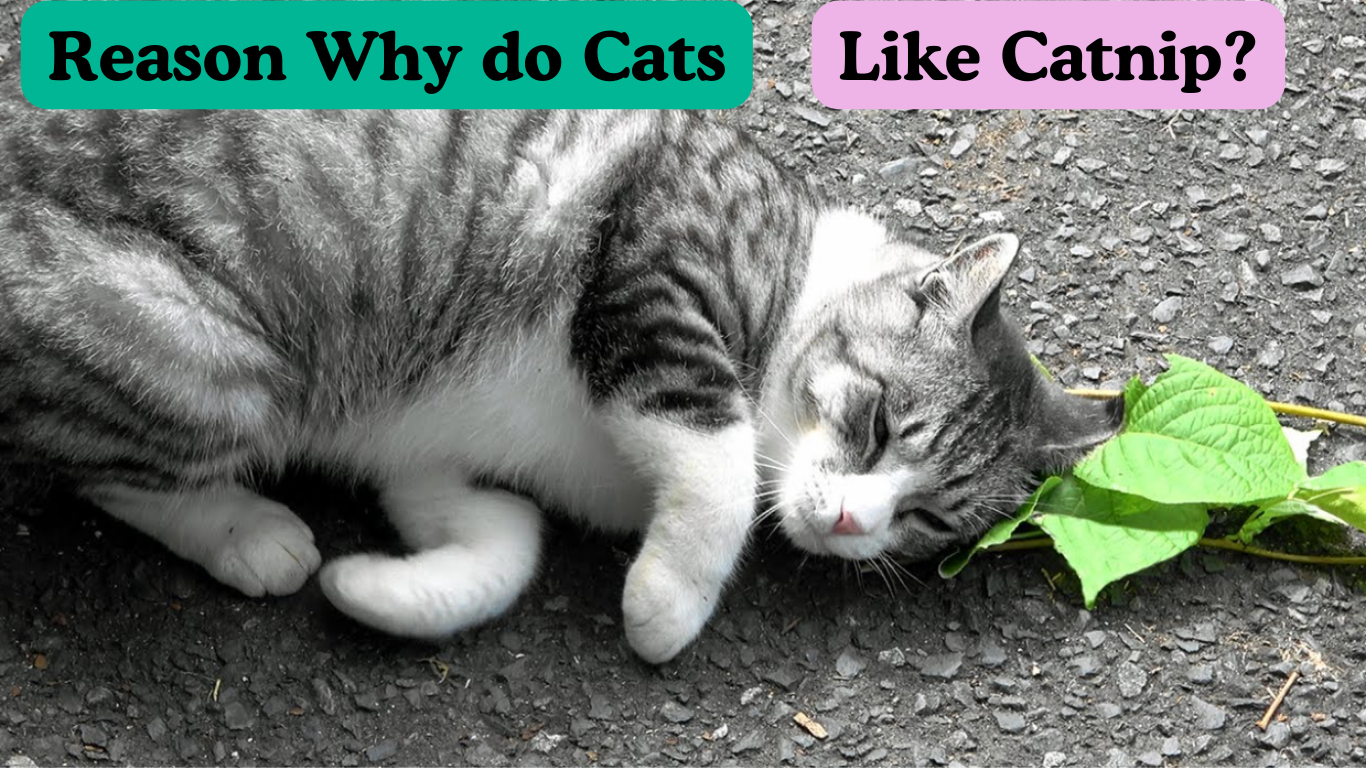Introduction
Curious why your cat goes crazy for catnip? You’re not alone! It’s a common question among pet owners. Let’s dive into the fascinating world of catnip and uncover why do cats like catnip. So, grab a comfy seat and let’s unravel the mystery together!
Jump to section
What is Catnip and How Does It Affect Cats?
The Science Behind Catnip
Catnip, scientifically known as Nepeta cataria, is a perennial herb belonging to the mint family. The active ingredient in catnip is nepetalactone, a natural chemical compound that triggers a unique response in cats. When cats encounter catnip, whether by sniffing, licking, or ingesting it, the nepetalactone stimulates sensory neurons in their olfactory tissue, leading to a series of fascinating behaviors and reactions.
The 6 Reasons Why do Cats Like Catnip
Reason 1: It Mimics Pheromones
Catnip contains nepetalactone, a compound that mimics pheromones found in the urine of felines. This similarity triggers a response in cats that is akin to their natural attraction to pheromones, leading to characteristic behaviors such as rolling, rubbing, and playful antics. This corresponds to one of the many main reasons why do cats like catnip.
Reason 2: Catnip as a Stress Reliever
For many cats, catnip acts as a natural stress reliever, offering a temporary escape from anxiety and tension. The euphoric effects of catnip help in calming nervous dispositions and promoting a sense of relaxation.
Reason 3: Catnip as a Form of Play
Catnip is not only an irresistible treat for cats, but it also serves as a powerful catalyst for play. The effects of catnip on feline behavior are fascinating and play an essential role in enhancing a cat’s overall well-being.
- Encourages Active Behavior: Catnip stimulates cats to engage in active and playful behavior, promoting exercise and physical fitness. It triggers a burst of energy that encourages running, jumping, and playful interaction with toys and other pets.
- Enhances Mental Stimulation: When cats are exposed to catnip, they experience heightened mental alertness and engage in more intellectual activities. This mental stimulation is vital for maintaining a healthy and active mind.
- Promotes Bonding: Using catnip during playtime can strengthen the bond between cats and their human companions. It creates shared moments of fun, laughter, and joy, contributing to a positive relationship between the cat and their owner.
Reason 4: The Genetic Component of Catnip Sensitivity
The genetic predisposition to catnip sensitivity underscores the hereditary influence on a cat’s response to this natural herb. It is intriguing to consider how genetic factors contribute to the diversity of feline reactions to catnip across different individuals.
Reason 5: Catnip as a Mood Enhancer
Catnip possesses mood-enhancing properties that elevate a cat’s spirits and imbue them with a sense of contentment. This mood-altering effect provides an enriching experience for cats and contributes to their emotional well-being.
Reason 6: Other Health Benefits of Catnip
Beyond its recreational appeal, catnip also offers potential health benefits for cats. It may aid in alleviating digestive discomfort, serve as a natural insect repellent, and even contribute to dental hygiene by encouraging gnawing and chewing behavior.

How Cats React to Catnip
When a cat encounters catnip, the response can vary from feline to feline. Some cats may become more playful and energetic, while others may exhibit a more mellow and relaxed demeanor. It’s important to note that not all cats are sensitive to catnip, with the inherited sensitivity being a genetic trait that affects approximately 50-70% of cats. The reaction typically lasts for 5 to 15 minutes, after which the cat becomes temporarily immune to further exposure.
Is Catnip Safe for Cats?
When it comes to the safety of catnip for cats, there are several key points to consider:
- Non-Toxic Nature: Catnip is generally regarded as safe and non-toxic for cats. The euphoric response induced by catnip is entirely harmless and poses no threat to the cat’s well-being.
- Moderation is Key: While catnip is safe for cats, it’s important to offer it in moderation. Excessive ingestion of catnip can lead to minor gastrointestinal disturbances. Therefore, it’s advisable to provide catnip as an occasional treat rather than a daily indulgence.
- Monitoring Your Cat’s Reaction: Just like with any new substance, it’s always best to monitor your cat’s initial reaction to catnip. While most cats respond positively to catnip, some may show little to no interest, and a very small percentage may exhibit signs of overstimulation that are best addressed by reducing or discontinuing exposure to catnip.
The Evolutionary Purpose of Catnip Sensitivity
Catnip sensitivity in cats is a fascinating evolutionary trait that has piqued the curiosity of cat owners and researchers alike. The origins of this unique sensitivity can be traced back to the wild ancestors of domestic cats, shedding light on the intricate relationship between cats and this remarkable herb.
Here are some key points to consider when exploring the evolutionary purpose of catnip sensitivity:
- Herbal Defense Mechanism: Catnip has been shown to repel insects and pests in the wild. This natural repellent quality would have provided a distinct survival advantage to cats, enabling them to thrive in their natural habitats by minimizing the risk of insect-borne diseases and infestations.
- Sensory Stimulation and Exercise: The interaction with catnip stimulates a range of sensory responses in cats, from enhanced olfactory experiences to playful behaviors. This sensory engagement not only serves as a form of mental and physical exercise but also contributes to the overall well-being of the feline species, reflecting the evolutionary need for mental and physical stimulation.
- Stress Relief and Environmental Adaptation: Catnip’s effects on cats extend beyond mere pleasure; they can provide stress relief and aid in environmental adaptation. In the wild, the ability to alleviate stress and adapt to changing environments would have been vital for the survival of cats, making catnip sensitivity a valuable trait with evolutionary significance.
Understanding the evolutionary basis of catnip sensitivity paints an intriguing picture of the intricate adaptations that have shaped the behavior and instincts of our feline companions.
Conclusion
Catnip, with its enchanting effects and alluring qualities, continues to captivate feline enthusiasts and researchers alike. Understanding the multifaceted reasons behind a cat’s fondness for catnip sheds light on the intricate relationship between felines and this intriguing herb.
Cats love catnip for a mix of reasons like the fun it brings and the way it makes them feel. It’s a simple pleasure that adds a bit of magic to our furry friends’ lives. So, next time you see your cat enjoying a sprinkle of catnip, know that it’s just their way of having a good time!

